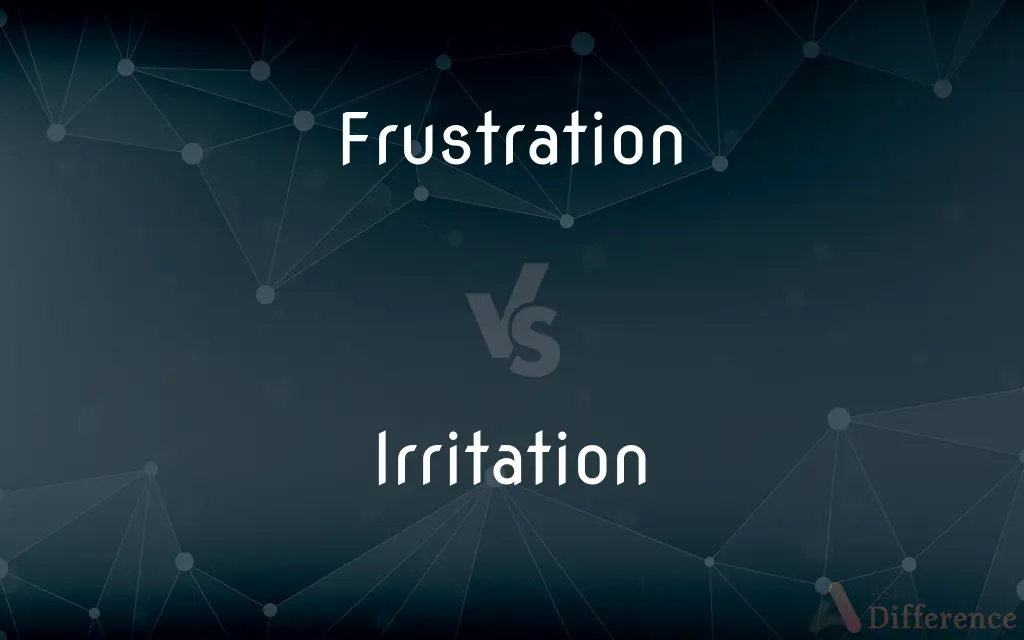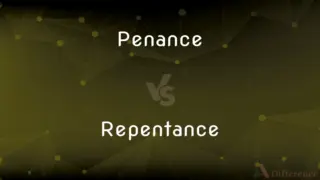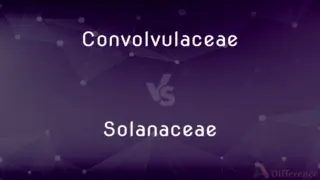Frustration vs. Irritation — What's the Difference?
By Tayyaba Rehman & Fiza Rafique — Published on October 25, 2023
Frustration is the feeling of being upset due to unmet expectations or obstacles, while irritation is a feeling of annoyance or discomfort, often caused by external stimuli.

Difference Between Frustration and Irritation
Table of Contents
ADVERTISEMENT
Key Differences
Frustration is a complex emotion often tied to one's goals, aspirations, or expectations. When these are thwarted or unmet, frustration arises. It's a response to internal desires being blocked. For instance, someone might feel frustration when repeatedly failing to achieve a personal goal. On the other hand, irritation is a more immediate and often reactive feeling. It can stem from external factors and is closely related to annoyance.
While frustration often has deeper roots, linked to our personal ambitions or desires, irritation can be more surface-level, resulting from factors like a buzzing mosquito or a disruptive noise. Frustration implies a longer-term struggle with unmet desires or expectations, while irritation can be fleeting, emerging quickly and fading once the irritant is removed.
Frustration often calls for introspection, as it can be linked to personal limitations or external roadblocks. It might require a change in strategy or approach. Irritation, meanwhile, is more about immediate reactions to discomforting situations or annoyances. One might respond to irritation by removing oneself from a situation or addressing the cause directly.
The intensity can also differ. While both emotions are distressing, frustration can be more consuming due to its link to one's aspirations. In contrast, irritation, being more superficial, may not have as profound an impact on one's mood or outlook.
Comparison Chart
Origin
Often from unmet expectations.
External stimuli causing discomfort.
ADVERTISEMENT
Duration
Can be long-term.
Often fleeting.
Depth
Tied to personal goals/aspirations.
Surface-level annoyance.
Typical Response
Requires introspection/strategy change.
Immediate reaction or removal from irritant.
Intensity
Can be deeply consuming.
Might be less profound in impact.
Compare with Definitions
Frustration
A feeling of discontent from blocked goals.
His repeated failures led to immense frustration.
Irritation
A cause of discomfort or annoyance.
The repetitive sound became a major irritation.
Frustration
The state of being unable to progress.
The traffic caused great frustration among commuters.
Irritation
A feeling of annoyance or discomfort.
The loud noise was a source of irritation.
Frustration
An emotion stemming from unmet expectations.
The team's loss was a source of frustration for fans.
Irritation
A reaction to an external stimulus.
The tag on the shirt caused skin irritation.
Frustration
A feeling of helplessness or defeat.
The complicated puzzle was a source of frustration.
Irritation
The state of being inflamed or aggravated.
The chemicals caused irritation to her eyes.
Frustration
The condition of being hindered.
The strict rules created frustration among students.
Irritation
The act of irritating
The prankster's irritation of the others in the dorm.
Frustration
The act of preventing the accomplishment or fulfillment of something
The defense's frustration of their opponent's attempts to score.
Irritation
The condition of being irritated; vexation
Honked the horn with irritation at the delay.
Frustration
The feeling or state of being frustrated
I couldn't get a real person to talk to and slammed down the phone in frustration.
Irritation
A source of irritation
Their constant talking is an irritation to people who are reading.
Frustration
Something that causes such a feeling or state
A job with many frustrations.
Irritation
An inflammatory reaction of a bodily part.
Frustration
The feeling of annoyance at impassibility from resistance.
Irritation
(Physiology) The elicitation of a response to a stimulus in a plant or animal organ or tissue, especially in a nerve or muscle.
Frustration
The act of frustrating, or the state, or an instance of being frustrated.
Irritation
The act of irritating or annoying
What irritation causes you to be so moody?
Frustration
(law) The state of contract that allows a party to back away from its contractual obligations due to (unforeseen) radical changes to the nature of the thing a party has been obligated to.
Irritation
The state of being irritated
Frustration
A thing that frustrates.
Irritation
A things or person that annoys
Frustration
Anger not directed at anything or anyone in particular.
Irritation
(physiology) a state of inflammation or painful reaction to allergy or cell-lining damage.
Frustration
The act of frustrating; disappointment; defeat; as, the frustration of one's designs.
Irritation
A condition of morbid excitability or oversensitiveness of an organ or part of the body; a state in which the application of ordinary stimuli produces pain or excessive or vitiated action.
Frustration
The feeling that accompanies an experience of being thwarted in attaining your goals
Irritation
The act of irritating, or exciting, or the state of being irritated; excitement; stimulation, usually of an undue and uncomfortable kind; especially, excitement of anger or passion; provocation; annoyance; anger.
The whole body of the arts and sciences composes one vast machinery for the irritation and development of the human intellect.
Frustration
An act of hindering someone's plans or efforts
Irritation
The act of exciting, or the condition of being excited to action, by stimulation; - as, the condition of an organ of sense, when its nerve is affected by some external body; esp., the act of exciting muscle fibers to contraction, by artificial stimulation; as, the irritation of a motor nerve by electricity; also, the condition of a muscle and nerve, under such stimulation.
Frustration
A feeling of annoyance at being hindered or criticized;
Her constant complaints were the main source of his frustration
Irritation
A condition of morbid excitability or oversensitiveness of an organ or part of the body; a state in which the application of ordinary stimuli produces pain or excessive or vitiated action.
Irritation
The psychological state of being irritated or annoyed
Irritation
A sudden outburst of anger;
His temper sparked like damp firewood
Irritation
(pathology) abnormal sensitivity to stimulation;
Any food produced irritation of the stomach
Irritation
The neural or electrical arousal of an organ or muscle or gland
Irritation
An uncomfortable feeling in some part of the body
Irritation
Unfriendly behavior that causes anger or resentment
Irritation
The act of troubling or annoying someone
Irritation
Annoyance resulting from persistent disturbances.
Constant interruptions were an irritation during the meeting.
Common Curiosities
Is irritation always due to external causes?
Often, but internal factors can also cause irritation, like a health issue.
Can frustration arise from internal factors?
Yes, unmet personal goals or expectations can cause frustration.
How can one manage irritation?
By addressing the cause or removing oneself from the irritant.
Is frustration always emotionally charged?
Often, due to its link with personal desires, but it can vary in intensity.
Is frustration always evident?
Not necessarily; some might internalize or hide their frustration.
Can frustration be momentary?
While it's often longer-term, brief episodes of frustration are possible.
Can one feel both frustration and irritation simultaneously?
Yes, for instance, one might feel frustrated by a problem and irritated by distractions.
Is irritation always a negative feeling?
Typically, it denotes discomfort or annoyance, which are negative.
Can overcoming obstacles reduce frustration?
Yes, achieving goals or removing roadblocks can alleviate frustration.
Can physical sensations cause irritation?
Yes, like itching or pain.
Share Your Discovery

Previous Comparison
Penance vs. Repentance
Next Comparison
Convolvulaceae vs. SolanaceaeAuthor Spotlight
Written by
Tayyaba RehmanTayyaba Rehman is a distinguished writer, currently serving as a primary contributor to askdifference.com. As a researcher in semantics and etymology, Tayyaba's passion for the complexity of languages and their distinctions has found a perfect home on the platform. Tayyaba delves into the intricacies of language, distinguishing between commonly confused words and phrases, thereby providing clarity for readers worldwide.
Co-written by
Fiza RafiqueFiza Rafique is a skilled content writer at AskDifference.com, where she meticulously refines and enhances written pieces. Drawing from her vast editorial expertise, Fiza ensures clarity, accuracy, and precision in every article. Passionate about language, she continually seeks to elevate the quality of content for readers worldwide.















































